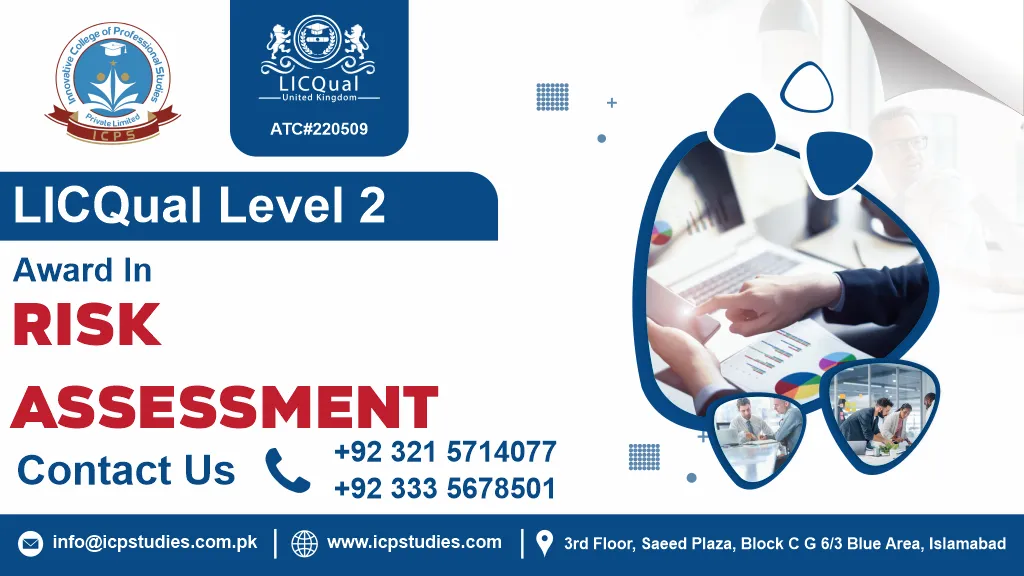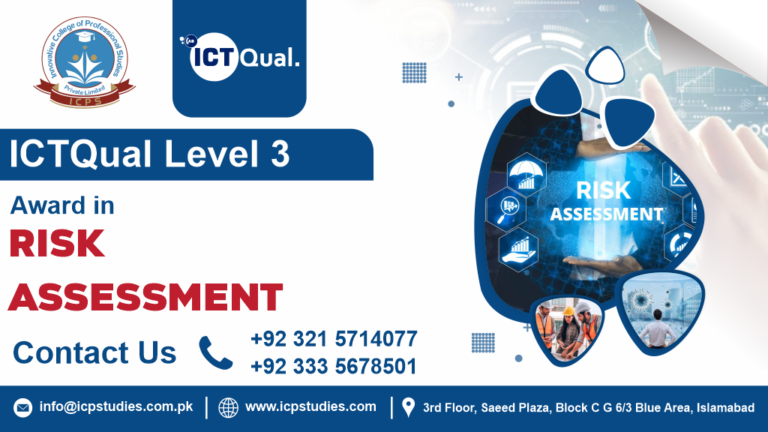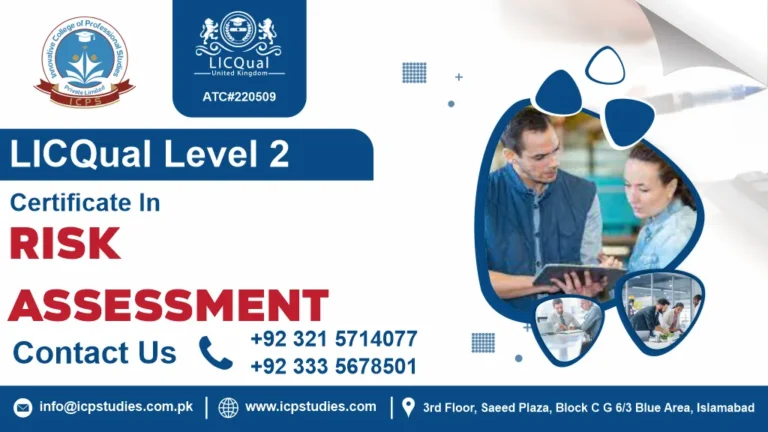In any workplace, the ability to identify, assess, and manage risks is crucial to maintaining a safe and productive environment. Risk assessments help ensure that businesses comply with health and safety regulations, reduce hazards, and create safer conditions for employees. If you’re looking to formalize your understanding of risk management, the LICQual Level 2 Award in Risk Assessment is an ideal qualification to boost your career in health and safety.
The LICQual Level 2 Award in Risk Assessment is a practical, assignment-based qualification aimed at professionals looking to develop a solid understanding of risk assessment principles and practices. This certification is perfect for individuals who need to conduct basic risk assessments in their workplace and ensure compliance with health and safety legislation.
The LICQual Level 2 Award in Risk Assessment is the perfect qualification for anyone looking to formalize their understanding of risk management and contribute to creating a safer, more compliant workplace. This assignment-based, UK-based certification provides practical, hands-on learning that is both flexible and applicable to real-world situations. Whether you’re new to health and safety or looking to enhance your existing knowledge, this course is an essential step toward advancing your career in risk management.
Don’t let risks hold you back—embrace the opportunity to lead with confidence. Enroll now in the LICQual Level 2 Award in Risk Assessment today and embark on a journey toward safety excellence. With our advanced curriculum, expert guidance, and industry recognition, you’ll emerge as a trusted leader in risk management.
All About LICQual Level 2 Award in Risk Assessment
Course Overview
The LICQual Level 2 Award in Risk Assessment is an advanced certification program designed to provide individuals with comprehensive knowledge and practical skills in conducting risk assessments across various contexts. Building upon the foundational principles covered in the Level 1 Award, this Level 2 qualification delves deeper into advanced risk assessment methodologies, legal frameworks, communication strategies, and leadership principles.
Participants will explore advanced risk assessment methodologies and techniques, such as quantitative risk assessment (QRA), probabilistic risk assessment (PRA), and scenario-based risk assessment. They will learn how to apply these methodologies to analyze complex risk scenarios and make informed decisions.
The course covers in-depth knowledge of legal and regulatory requirements related to risk management. Participants will gain an understanding of relevant legislation, standards, and industry-specific regulations governing risk assessment practices.
Leadership skills are crucial for driving a culture of safety and promoting effective risk management practices. Participants will develop leadership competencies such as decision-making, problem-solving, conflict resolution, and change management, enabling them to lead risk management initiatives within their organizations.
The LICQual Level 2 Award in Risk Assessment is designed to equip professionals with the advanced knowledge, skills, and leadership abilities needed to excel in risk management roles. By completing this qualification, participants demonstrate their commitment to excellence and readiness to take on leadership responsibilities in promoting safety and managing risks effectively within their organizations.
Study Units
Learning Outcomes
Here are the expected outcomes for each study unit:
Introduction to Risk Assessment
- Gain a comprehensive understanding of the concept of risk assessment and its importance in various contexts.
- Learn about the principles and objectives of risk assessment.
- Understand the roles and responsibilities of individuals involved in the risk assessment process.
- Appreciate the significance of proactive risk management in preventing incidents and promoting safety.
Identifying Hazards and Risks
- Develop the skills to identify and recognize different types of hazards and risks in diverse environments.
- Learn how to conduct thorough hazard identification assessments using various methods, such as inspections, observations, and consultations with stakeholders.
- Understand the importance of considering both workplace-specific and industry-wide hazards and risks.
Risk Assessment Methods
- Explore different risk assessment methodologies, including qualitative, semi-quantitative, and quantitative approaches.
- Gain proficiency in applying risk assessment techniques, such as risk matrices, fault tree analysis, and bowtie analysis.
- Learn how to assess the likelihood and severity of identified risks and prioritize them based on their potential impact.
Implementing Control Measures
- Acquire knowledge of various risk control measures and strategies for mitigating identified risks.
- Understand the hierarchy of control and the principles of selecting and implementing appropriate control measures.
- Learn how to develop and implement action plans to address identified hazards and risks effectively.
Communication and Documentation
- Develop effective communication skills for conveying risk assessment findings to stakeholders at all levels of the organization.
- Learn how to prepare clear and concise risk assessment reports, including risk registers, risk matrices, and mitigation plans.
- Understand the importance of documenting the risk assessment process and outcomes for accountability, compliance, and continuous improvement purposes.
By completing these study units, participants will develop a comprehensive understanding of risk assessment principles, methodologies, and best practices. They will also gain practical skills in identifying hazards, assessing risks, implementing control measures, and communicating findings effectively to stakeholders. Ultimately, participants will be equipped with the knowledge and tools needed to contribute to a safer and healthier working environment.
Admission Criteria
The entry requirements for the course “Introduction to Risk Assessment” typically include:
- Educational Background:
- There are usually no strict educational prerequisites for enrolling in this course. However, a basic level of literacy and numeracy may be beneficial for comprehending course materials and participating effectively in assessments.
- Work Experience:
- While not always mandatory, some prior work experience in roles related to health and safety, risk management, or related fields may be advantageous. Previous experience in a workplace environment can provide valuable context for understanding risk assessment concepts.
- Language Proficiency:
- Candidates should have a sufficient level of proficiency in the language of instruction (usually English) to understand course materials, participate in discussions, and complete assessments. Language proficiency requirements may vary depending on the institution or training provider.
- Access to Learning Resources:
- Candidates should have access to the necessary learning resources, such as course materials, textbooks, and online platforms, to support their studies. This may include access to a computer with internet connectivity and basic computer literacy skills.
- Commitment and Motivation:
- Successful completion of the course requires a commitment to learning and a strong motivation to acquire knowledge and skills in risk assessment. Candidates should be prepared to dedicate time and effort to their studies and actively engage with course materials and activities.
- Admission Procedures:
- Candidates may need to undergo an admissions process, which could include submitting an application form, providing relevant personal information, and possibly attending an interview or assessment to assess suitability for the course.
- Prerequisites for Advanced Courses:
- Depending on the candidate’s career goals and aspirations, successful completion of this introductory course may serve as a prerequisite for enrolling in more advanced courses in risk management or related fields. Candidates interested in pursuing further qualifications should review the entry requirements of those programs.
It’s essential for prospective candidates to review the entry requirements outlined by the institution or training provider offering the “Introduction to Risk Assessment” course. Meeting these requirements ensures that candidates are adequately prepared to undertake the course and derive maximum benefit from their learning experience.
Ideal Candidate
The “Introduction to Risk Assessment” course is designed for individuals across various industries who are interested in gaining a fundamental understanding of risk assessment principles and practices. This course is particularly beneficial for:
- Entry-Level Professionals: Individuals who are new to roles involving health and safety, risk management, or related fields and wish to develop a foundational understanding of risk assessment concepts.
- Small Business Owners: Entrepreneurs and small business owners who want to learn how to identify, assess, and manage risks within their organizations to ensure compliance and promote safety.
- Managers and Supervisors: Managers, supervisors, and team leaders who are responsible for ensuring the safety of their teams and workplaces and want to enhance their knowledge of risk assessment.
- Human Resources Personnel: HR professionals involved in employee training, workplace safety policies, and compliance management who require a basic understanding of risk assessment principles.
- Employees with Safety Responsibilities: Individuals within organizations who have specific safety responsibilities or are designated as safety representatives and need to understand how to identify and manage risks effectively.
- Students and Recent Graduates: Students and recent graduates studying health and safety, environmental science, engineering, or related fields who want to supplement their academic studies with practical knowledge of risk assessment.
- Anyone Interested in Workplace Safety: Individuals who are passionate about promoting workplace safety and creating a culture of risk awareness within their organizations, regardless of their job title or industry.
- Professionals Considering Career Changes: Individuals considering a career change into health and safety, risk management, or related fields who want to explore foundational concepts before pursuing further qualifications or career opportunities.
Overall, the “Introduction to Risk Assessment” course is suitable for anyone seeking to gain a basic understanding of risk assessment principles and practices, regardless of their background or experience level. Whether you’re just starting your career or looking to enhance your skills in workplace safety, this course provides valuable insights into identifying, assessing, and managing risks effectively.
FAQs for Level 2 Award in Risk Assessment







